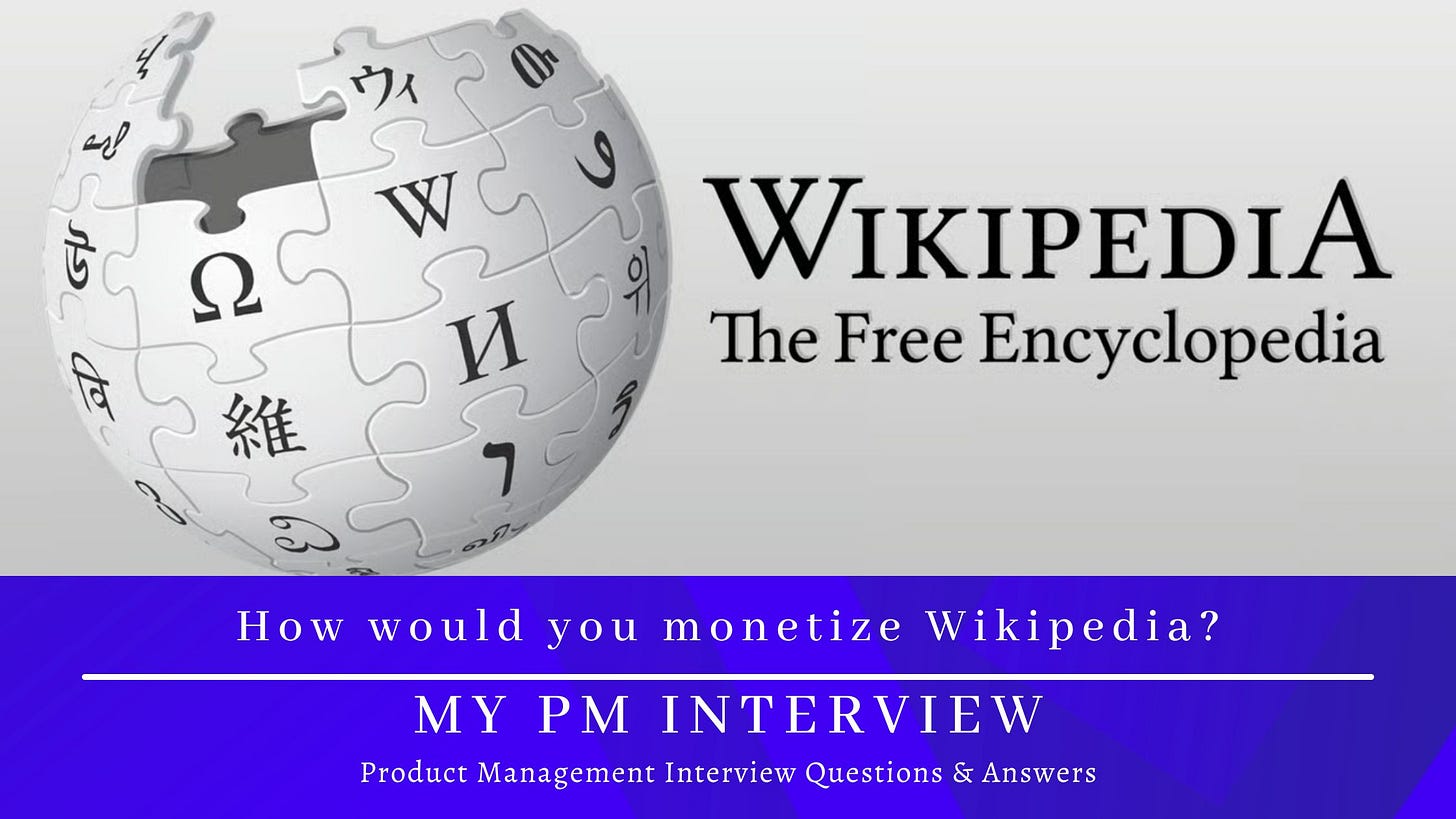How would you monetize Wikipedia?
It’s the 5th most visited site on the internet. It fuels everything from your college essay to Google’s AI — and yet, it’s running on donations. What would you do as a PM to make it self-sustaining.
Imagine being the PM tasked with this question:
“How would you monetize Wikipedia?”
Sounds like a dream brief, right? Until you realize it’s a minefield of tradeoffs.
Wikipedia isn’t just another B2C platform. It’s a public good — the digital library of Alexandria for the modern age. It has:
Billions of page views per month
A fiercely loyal, global community of contributors
A brand built on neutrality, openness, and trust
And here’s the kicker:
They’ve rejected ads for decades.
The organization behind Wikipedia — the Wikimedia Foundation — runs entirely on donations, which spike seasonally and leave the project perpetually underfunded. Servers cost money. Fighting misinformation takes money. Yet the product proudly remains free.
So as a product manager, you're handed a fascinating challenge:
💡 Can you find a way to monetize Wikipedia... without turning it into something it was never meant to be?
Product Goals and Constraints
Before rushing to brainstorm monetization ideas, a good PM takes a pause and defines the guardrails.
Let’s set clear goals and acknowledge the non-negotiables:
🎯 Goals:
Create sustainable, year-round revenue streams
Reduce dependence on seasonal donation drives
Ensure Wikipedia can scale infrastructure, moderation, and tooling
Invest in community support and product improvement
🚫 Constraints (AKA: Do No Harm Rules):
Core content must remain 100% free and accessible
No traditional ads or tracking-based monetization
No commercial influence over editorial content
Any monetization must preserve — or enhance — community trust
In short, we can monetize around Wikipedia — but never through the encyclopedia itself.
This means traditional tactics like display ads, paid access, or paywalls are instantly off the table. Which leads us to the real work...
Step 1: Describe the Product
Wikipedia is a free, community-curated online encyclopedia offering detailed, source-backed information on virtually every topic imaginable — from ancient civilizations to meme culture.
It’s:
Open to editing by anyone
Available globally in 300+ languages
Maintained by a volunteer army of editors
Operated by a non-profit foundation (Wikimedia)
Core value proposition:
“Free, factual, global knowledge for everyone, forever.”
Users include:
Students looking for academic help
Researchers gathering background info
Journalists & content creators
Casual users checking quick facts
Educators designing curriculum
AI models and platforms that mine knowledge
Step 2: Ask Clarifying Questions
Are we focused on revenue or profit?
→ Revenue. Assume mission-aligned monetization to ensure sustainability.
Are we targeting a specific user group or global users?
→ Global consumers, especially mobile-first users.
Should we consider ads, subscriptions, or premium models?
→ Open to all — as long as we preserve Wikipedia’s integrity and user trust.
Are we allowed to alter the free experience?
→ The free encyclopedia experience must remain untouched. Monetization must be additive, not restrictive.
Is this about just Wikipedia, or the broader Wikimedia suite (e.g., Wikibooks, Wikivoyage)?
→ Focus on Wikipedia.org only.
Step 3: Define the Goal
The core goal is to generate sustainable, recurring revenue to:
Fund growing infrastructure costs
Support community moderation
Reduce dependence on unpredictable donations
Ensure neutrality and freedom remain uncompromised
The constraint?
Don't compromise the free experience or betray community trust.
Step 4: List the User Segments
Casual Readers — 90% of users who bounce in from Google to read one page
Power Users / Editors — Frequent contributors who edit or fact-check
Students / Academics — Heavy users for research and projects
Enterprises & Data Consumers — Businesses using Wikipedia as a data backend
Supporters / Donors — Mission-aligned users who’ve donated before
🎯 Chosen Segment: Enterprises & Supporters
Why?
Enterprises benefit materially from Wikipedia (AI, search, SEO)
Supporters already see value in the mission and are more likely to pay if offered perks



